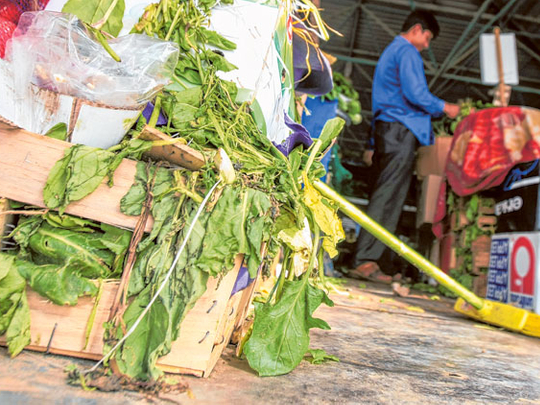
Dubai: It is not an uncommon sight to see people staggering their plates with mountains of food while standing in buffet lines, as they are merely trying to get the best value for money.
And restaurant managers have said that it is their responsibility to make sure that the buffet table is never empty, pointing out that they spare no expense when writing up their food budget for the month as that it is where they get a large chunk of their profits from.
A popular restaurant chain in Deira, which serves a daily buffet with unlimited drinks, has a budget for the buffet at Dh100,000-Dh120,000 per month, but nearly Dh15,000 worth of leftover food is thrown away into the dustbin.
“We offer a three-course meal buffet with unlimited non-alcoholic beverages for Dh59 and receive dozens of people a day,” said the restaurant manager. “Our budget for the food changes in relation to the prices, but on average we spend Dh100,000 a month and 15 per cent of the food [Dh500] per day is thrown away because people pile on more food on their plates than they can eat.”
A survey conducted last November by market research team YouGov, who carried it out for Al Aan TV’s Nabd Al Arab (Arabs’ Pulse), revealed that one in six respondents (15 per cent) said they deliberately cooked too much to make sure there was always enough food, and a third (34 per cent) said they only sometimes tried to use up the food that was nearest to the expiry date first.
Dubai Municipality has already recognised that food waste is a growing problem, and according to its latest statistics, 33 per cent of all municipal waste collected in 2012 was organic, while 35 per cent of waste in shopping centres was in food, and it is usually this type of waste that goes straight to landfills.
“In the future, we want to conduct a survey across households to see how much organic waste is produced, as right now we are only carrying out manual inspections on shopping centres,” said Abdul Majeed Saifaie, director of Waste Management Department at Dubai Municipality.
But authorities have managed to gradually reduce the amount of food waste across the Emirate and according to municipal statistics, the total amount of solid waste recorded by Dubai Municipality was 2,689,809 metric tons in 2011, which is a decline from 3,746,515 metric tons in 2009.
Saifaie further added that an organic recycling project has already been rolled out in homes among Emirati families and has introduced 8,000 bins for organic and non-organic waste in the areas of Mizahar 1 and 2, in addition to Nad Al Hammar.
The second phase will incorporate the homes of Emiratis and expatriates into four areas of Bur Dubai, as well as one in Jumeirah and another in Al Barsha.












